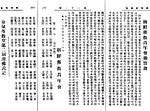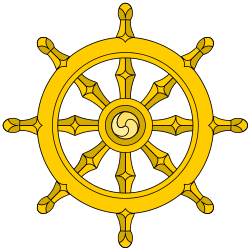Chunseong

| Chunseong | |
|---|---|
| Born |
March 30, 1891 Inje, Gangwon, Joseon |
| Chunseong | |
| Hangul | 춘성 |
|---|---|
| Hanja | 春城 |
| Revised Romanization | Chunseong |
| McCune–Reischauer | Chunsŏng |
| Pen name | |
| Hangul | 춘성, 무애도인 |
| Hanja | 春性, 無碍道人 |
| Revised Romanization | Muaedoin |
| Birth name | |
| Hangul | 이창림 |
| Hanja | 李昌林 |
| Revised Romanization | I Changnim |
| McCune–Reischauer | Yi Ch'angnim |
| Dharma name | |
| Hangul | 춘성 |
| Hanja | 春城 |
| Revised Romanization | Chunseong |
| McCune–Reischauer | Chunsŏng |
| Part of a series on |
| Buddhism |
|---|
 |
|
Chunseong (Hangul: 춘성; Hanja: 春城), born Lee Changnim (이창림, 李昌林; March 30, 1891 – August 22, 1977), was a Korean Buddhist monk, scholar, poet, writer, and philosopher. His courtesy name was Muaedoin (무애도인, 無碍道人) or Chunseong (춘성, 春性).[1]
Early life
Chunsong was born in 1891, in the Sokchang, Inje county in Gangwon Province. His father was Lee In-oh (이인오, 李仁五) and his mother was Lady Park of Milyang (밀양박씨). He was the oldest of four brothers. Chunsong's family was of the Pyungchang Lee clan (평창이씨, 平昌李氏). His father was a tenant farmer. Chunsong's birth name was Lee Changrim (이창림, 李昌林), but Chunsong (춘성, 春城) was his Buddhism Baptism name. His nickname was Chunsong and he was often called Chunsong Chunsong (春城 春性).
Early Monk life
In his early years, Chunsong went to the Baikdam temple (백담사), a famous Buddhist temple in Inje. He begged to be a pupil, but abbess Manhae Han Yong-un (만해 한용운, 萬海 韓龍雲) rejected him because he was too young. Finally, at age fifteen, he became a Buddhist monk, apprenticing under Manhae Han Yong-un.[2]
Chunsong was required to read through Hwaumgyong (화엄경, 華嚴經) and Geumganggyong (금강경, 金剛經). He was to learn them so well that he could recite Hwaumgyong backward. Because of this, he earned the nickname "Hwaum priest" (화엄법사, 華嚴法師).
March 1 movement
In November 1918, Chunsong's teacher published Whole Mind (Yusim), a magazine to enlighten youth. Later, after the march 1 movement, Yong-un was imprisoned for his involvement. Chunseong sent supplies to his teacher in prison.[3] Han Yong-un was angry because the Buddhism temple's land and property were confiscated. He said "You get rid of temple's land and possessions? You care nothing of my students." Later, Chunsong introduced himself as "I am nothing teacher."
After that, Han Yong-un used a different method for receiving secret papers. Chunsong was a post distribution for the Provisional Government of Korea in Shanghai. In 1920, he was appointed abbot of Mangwol Temple and Shinheung Temple. From 1925 to 1935, he learned the doctrines of Buddhist scriptures under the instruction of the monk, Baik Yongseong (백용성, 白龍成).
His famous jokes
My hometown is my mother's vagina
At the time when Korea was under Japanese rule, he went to a mountain, and illegally cut down white oak.[2] He was arrested by a Japanese police office or forest management office for violating forest rules. The Japanese police asked him 'Where are you from?" He replied, "I am from my mother's vagina.[4]" This made the police angry and they asked him where his original domicile was. Chunseong answered "I am originally from the domicile of my father's penis[5]'.[2] He took a long time answering the police's questions and finally the fatigued police released him because he did not answer.
Jesus' resurrection
One day, he was going to Busan and returned to Seoul. Embarking from a bus were some fanatical Christians. They said that Jesus had one death and one resurrection. They said Buddha was dead. So Chunsongs said "What? Jesus had one death and one resurrection? My penis had several thousand deaths and several thousand resurrections. Would you put your trust to my penis?" The people who were trying to convert him went speedily away.[6]
Jung daejang
He sometimes drank beer or fermented liquor (막걸리). or grain drink (곡차, 穀茶 or 曲茶).
One morning, he had too much to drink and went to the temple. The police asked "Who is this?" [3] Chunsong said, "I am Jungdaejang!" The police said, "to what your Jungdaejang? your nothing monk?" He said, "more liquor monk is me, so I am Jungdaejang (중대장, 中隊長).[3] The joke was a pun on the name of the liquor company, Jungdae (중대, 中隊), the name of the military captain, Jungdaejang, the word for monk, Jung (중, 僧) and the word for commander, Daejang.
Your inside
An elderly woman went to listen to his Buddhism lecture, and wanted to wear a miniskirt. But he said to the girl, "You're small inside so how My Big 것 go inside?" The woman started crying, saying, "you are a nonsense monk". She returned to her home and told of her conversation with Chunsung to her grandmother. Her grandmother said "The monk had a big meaning. How were you to understand?" Then the old age miss understood for the first time.[2]
Practice
Throughout his life, Chunsong lived without quilt or coverlet. In the Korean language, the spelling of quilt is "Yibul" (이불).[2] Because Chunsong was Yibul spelling resemble to Yibul (이불, 離佛, to separate Buddha).[2]
Chunsong did not believe in owning things.[2] His followers gave him clothes. When he encountered beggars and vagrants, he would give them his clothes.[2] Because of this, he had to stay close to a place to hide and return to temple and at night.
The temple believers contributed money to him. However he generously gave it away.[2]
Korean war
In the 1940s, he was told to cooperate with the law of Sōshi-kaimei (창씨개명, 創氏改名) and change his name. He refused.
In 1944, he went to the Doksungsan Sudeok Temple, where he studied under Mangong Song Wolmyon (만공 송월면, 萬空 宋月面).[2] Mangong was top of the Korean Ganhwaseon (看話禪, 간화선). He trained for Mangong. In 1946 he returned to Mangwol Temple (망월사, 望月寺) as its head. Chunsong was attacked for hypocrisy, rigorism, pretended philanthropy and formalism. In July 1949, he participated in funerals for Baikbum Kim Gu (백범김구 국민장, 白凡金九 國民葬)
In 1950, during the Korean war, he escaped and returned to Mangwol Temple. At the end Korean war, return to more monk was bashfulness. "it likes dog penis, welcome" (야 이 개좃같은 놈아. 잘 왔다).
During the war, he saved Ganhwaseon tradition and the Mangwol Temple. In the 1950s, he became abbot of the Mangwol Temple, Shinheung Temple and the Bomun Temple.
Last years
In the 1960s, the South Korean regent was Park Chung-hee. In 1964, Chunsong was invited by him to Chungwadae (청와대, 靑瓦臺). Park's wife Yuk Young-su was a devout Buddhist. Chunsong said, "that day Lady Yuk was born to her mother's vagina", causing panic.[3]
In 1970, he again went to Mangwol temple. From 1970 to 1973 he practiced asceticism for Jangjabulwa (장좌불와, 長坐不臥), In 1973 he participated in public campaigns for safe driving and sobriety.
Death
In 1977, he died in Mangwolsa, in Uijongbu. He was 77 and his Religion aged 54.
At his funeral, he did not have a coffin. Instead, his corpse was covered with a straw mat. His funeral was short, with an abbreviated funeral march, in which monks sang the song, "Grief of traveller" (나그네 설움). His ashes are enshrined Temple Bongkuk, in Seongnam City.
Long after his death, Chunsong's name was a social taboo for South Korea because of his controversial words and actions along with the social influence of Confucianism. That taboo eased in the 1990s, but in 2002, Doal Kim Yong-ok used one of his anecdotes for EBS TV's one program.[7][8] In 2004, South Korean broadcasting began to report his words and actions.[7]
See also
References
- Doh Jin-Soon : 《Great monk & Great learning》 (큰 스님 큰 가르침) (Seoul; Moonwae, 2006)
- Kim Kwang-sik : 《Choonseong:Mooaedoin's Story》 (춘성:무애도인 삶의 이야기) (Seoul; SaeSsak, 2009)
- Samjoong : 《The More story behind》 (숨겨왔던 많은 이야기들) (Seoul, KukbooCarma, 2009)
Notes
- ↑ 춘성:한국역대인물종합정보
- 1 2 3 4 5 6 7 8 9 10 (20) 망월사 춘성선사 한겨레 2005.06.14
- 1 2 3 4 “걸출하고 막힘 없던 춘성스님, 신라때 태어났다면 딱 원효” 문화일보 2009년 03월 09일자
- ↑ 내 고향은 우리 어머니 보지다.
- ↑ 내 본적지는 우리 아버지 자지다.
- ↑ [문화] 역마直星 들린 山사람 구수한 三材 얘기보따리 문화일보 1999년 11월 24일자
- 1 2 [여의도 스페셜] 도올 TV강의서 육두문자 써 논란 중앙일보 2002.10.08
- ↑ 도올 TV 강의서 육두문자 인용 구설수 – 오마이뉴스
External links
| Wikisource has original works written by or about: Chunseong |
- 춘성 스님 (Korean)
- 망월사 춘성선사 – 한겨레 (Korean)
- 춘성:한국역대인물종합정보 (Korean)
- 도올 TV 강의서 육두문자 인용 구설수 – 오마이뉴스 (Korean)
- 도올 TV 강의 육두문자 논란- 한국일보 (Korean)
- [아침을 열며] 인간에 대한 믿음 (Korean)